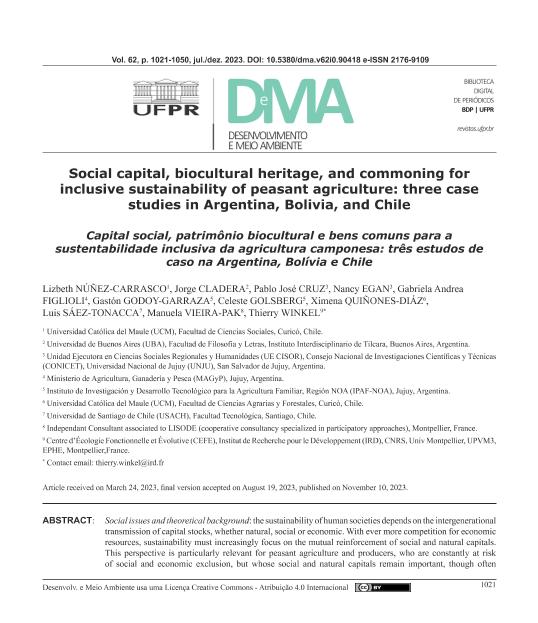Artículo
Social issues and theoretical background: the sustainability of human societies depends on the intergenerational transmission of capital stocks, whether natural, social or economic. With ever more competition for economic resources, sustainability must increasingly focus on the mutual reinforcement of social and natural capitals. This perspective is particularly relevant for peasant agriculture and producers, who are constantly at risk of social and economic exclusion, but whose social and natural capitals remain important, though often underutilized, even by the peasants themselves. The concepts of commoning and social capital are useful for addressing these issues and activating biocultural heritage from an ethically inclusive sustainability perspective. Objective and methods: We seek to understand how peasants organize to collectively achieve goals of social and economic inclusion that could promote their sustainability and resilience in the face of economic constraints. Using field surveys and participatory action research, we analyzed the social, economic, and environmental factors that fostered the emergence and sustainability of producer organizations and their value chains. This was done in three peasant organizations in Argentina, Bolivia and Chile, whose common starting point is the valorization of traditional quinoa grain, but which differ greatly in terms of size, internal dynamics and organizational trajectories. Results: The successes and challenges of the social innovations implemented in the three cases studied provide lessons on how farmers can mobilize their social capital and leverage the resources of their cultural and natural capitals to achieve ethically inclusive sustainability. While some lessons remain context-specific, others appear to be independent of the size and place of organizations, and several demonstrate the importance of socio-ethical interactions cultivated both within organizations and with consumers. Problemática social e fundamento teórico: A sustentabilidade das sociedades humanas depende da transmissão intergeracional dos estoques de capital, sejam eles naturais, sociais ou econômicos. Com a concorrência crescente por recursos econômicos, a sustentabilidade deve se concentrar cada vez mais no reforço mútuo do capital social e natural. Esta perspectiva é particularmente relevante para a agricultura camponesa e para os produtores sob constante ameaça de exclusão social e econômica, mas cujo capital social e natural permanece importante, embora frequentemente subutilizado, mesmo pelos próprios camponeses. Os conceitos de capital social e bens comuns são úteis para abordar estas questões e ativar o patrimônio biocultural a partir de uma perspectiva de sustentabilidade eticamente inclusiva. Objetivos e métodos: Procuramos entender como os camponeses se organizam para alcançar coletivamente objetivos de inclusão social e econômica que possam promover sua sustentabilidade e resiliência diante das restrições econômicas. Utilizando pesquisas de campo e pesquisa-ação participativa, analisamos os fatores sociais, econômicos e ambientais que promoveram o surgimento e a sustentabilidade das organizações de produtores e suas cadeias de valor. Fizemos isso em três organizações camponesas na Argentina, Bolívia e Chile, que compartilham um ponto de partida comum em torno da valorização do grão tradicional de quinoa, mas variam muito em termos de tamanho, dinâmica interna e trajetórias organizacionais. Resultados: Os sucessos e desafos das inovações sociais implementadas nos três casos estudados fornecem lições sobre como os agricultores mobilizam seu capital social e aproveitam os recursos de seu capital cultural e natural para alcançar a sustentabilidade eticamente inclusiva. Enquanto algumas lições permanecem específcas do contexto, outras parecem ser independentes do tamanho e do lugar das organizações, e várias demonstram a importância das interações sócio-éticas mantidas tanto dentro das organizações quanto com os consumidores.
Social capital, biocultural heritage, and commoning for inclusive sustainability of peasant agriculture: three case studies in Argentina, Bolivia, and Chile
Título:
Capital social, patrimônio biocultural e bens comuns para a sustentabilidade inclusiva da agricultura camponesa: três estudos de caso na Argentina, Bolívia e Chile
Núñez Carrasco, Lizbeth; Cladera, Jorge Luis ; Cruz, Pablo
; Cruz, Pablo ; Egan, Nancy
; Egan, Nancy ; Figlioli, Gabriela Andrea; Godoy Garraza, Gastón
; Figlioli, Gabriela Andrea; Godoy Garraza, Gastón ; Golsberg, Celeste; Quiñones Diáz, Ximena; Sáez Tonacca, Luis; Vieira Pak, Manuela; Winkel, Thierry
; Golsberg, Celeste; Quiñones Diáz, Ximena; Sáez Tonacca, Luis; Vieira Pak, Manuela; Winkel, Thierry
 ; Cruz, Pablo
; Cruz, Pablo ; Egan, Nancy
; Egan, Nancy ; Figlioli, Gabriela Andrea; Godoy Garraza, Gastón
; Figlioli, Gabriela Andrea; Godoy Garraza, Gastón ; Golsberg, Celeste; Quiñones Diáz, Ximena; Sáez Tonacca, Luis; Vieira Pak, Manuela; Winkel, Thierry
; Golsberg, Celeste; Quiñones Diáz, Ximena; Sáez Tonacca, Luis; Vieira Pak, Manuela; Winkel, Thierry
Fecha de publicación:
11/2023
Editorial:
Universidade Federal do Paraná
Revista:
Desenvolvimento e Meio Ambiente
ISSN:
1518-952X
e-ISSN:
2176-9109
Idioma:
Inglés
Tipo de recurso:
Artículo publicado
Clasificación temática:
Resumen
Archivos asociados
Licencia
Identificadores
Colecciones
Articulos(UE-CISOR)
Articulos de UNIDAD EJECUTORA EN CIENCIAS SOCIALES REGIONALES Y HUMANIDADES
Articulos de UNIDAD EJECUTORA EN CIENCIAS SOCIALES REGIONALES Y HUMANIDADES
Citación
Núñez Carrasco, Lizbeth; Cladera, Jorge Luis; Cruz, Pablo; Egan, Nancy; Figlioli, Gabriela Andrea; et al.; Social capital, biocultural heritage, and commoning for inclusive sustainability of peasant agriculture: three case studies in Argentina, Bolivia, and Chile; Universidade Federal do Paraná; Desenvolvimento e Meio Ambiente; 62; 11-2023; 1021-1050
Compartir



